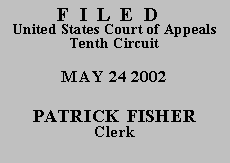

| UNITED STATES OF AMERICA, |
96-CR-460-1-D)
|
Pro se defendant Tony Carver seeks a certificate of appealability to pursue his appeal of the district court's denial of his petition for a writ of habeas corpus filed pursuant to 28 U.S.C. § 2255.
Mr. Carver pleaded guilty in federal district court to one count of distributing and possession with intent to distribute less than five grams of crack cocaine in violation of 21 U.S.C. §§ 841(a)(1) and 841(b)(1)(C). The district court sentenced him to 151 months' incarceration, and we upheld the sentence on direct appeal. United States v. Carver, 160 F.3d 1266 (10th Cir. 1998). He then filed a motion for postconviction relief, asking the district court to vacate his sentence on several grounds. The district court denied his motion, and denied his subsequent motion for a certificate of appealability.
Mr. Carver now appeals the district court's decision, seeking a certificate of appealability. He argues that his constitutional rights to equal protection and due process were violated by an alleged breach of the plea agreement, and that he received ineffective assistance of counsel. In determining whether to grant a certificate of appealability, we examine whether he has made a substantial showing of the denial of a constitutional right. 28 U.S.C. § 2253(c)(2). "Where a district court has rejected the constitutional claims on the merits, the showing required to satisfy § 2253(c) is straightforward: The petitioner must demonstrate that reasonable jurists would find the district court's assessment of the constitutional claims debatable or wrong." Slack v. McDaniel, 529 U.S. 473, 484 (2000).
The defendant signed a plea agreement that contained apparently contradictory language about the drug quantity. It states that he pleads guilty to one count of possession of less than five grams of crack cocaine with intent to distribute, but it also indicates that the recommended sentence of 151 months is based on an amount of 118 grams. At sentencing, the district court found by a preponderance of the evidence that Mr. Carver's offense involved 118 grams.
Mr. Carver challenges the district court's consideration of the uncharged quantity as a violation of the plea agreement and a violation of Apprendi v. New Jersey, 530 U.S. 466 (2000). The district court rejected his claim. The 118.2 gram quantity was reflected in the plea agreement, and could be considered for sentencing even if it were not charged in the indictment. United States v. Hishaw, 235 F.3d 565, 577 (10th Cir. 2000) ("[A]s long as the defendant's sentence falls within the maximum established by statute, Apprendi does not foreclose consideration of drug quantities beyond the offense of conviction."). The Apprendi rule does not apply to sentencing factors that increase a defendant's guideline range but do not increase the statutory maximum. United States v. Sullivan, 255 F.3d 1256, 1265 (10th Cir. 2001). Mr. Carver's sentence of 151 months falls within the 20 year statutory maximum under § 841(b)(1)(C). We therefore find no constitutional violation.
Mr. Carver also argues that he received ineffective assistance of counsel. A defendant challenging a guilty plea on the grounds of ineffective assistance of counsel must show that counsel's advice was not "within the range of competence demanded of attorneys in criminal cases" and that "there is a reasonable probability that, but for counsel's errors, [defendant] would not have pleaded guilty and would have insisted on going to trial." Hill v. Lockhart, 474 U.S. 52, 57, 59 (1985). Mr. Carver alleges that counsel was ineffective in failing to object to the court's finding of the 118 gram quantity of crack cocaine by only a preponderance of the evidence. We already found that the district court did not err in finding the drug quantity by a preponderance of the evidence. Moreover, Mr. Carver was informed at sentencing that he would receive a minimum of 151 months' imprisonment, and he voluntarily decided to plead guilty.
Mr. Carver has failed to raise a constitutional claim debatable by reasonable jurists. Mr. Carver's request for a certificate of appealability is therefore DENIED and the appeal is DISMISSED.
ENTERED FOR THE COURT,
Deanell Reece Tacha
Chief Circuit Judge
*.This order and judgment is not binding precedent, except under the doctrines of law of the case, res judicata, and collateral estoppel. This court generally disfavors the citation of orders and judgments; nevertheless, an order and judgment may be cited under the terms and conditions of 10th Cir. R. 36.3.